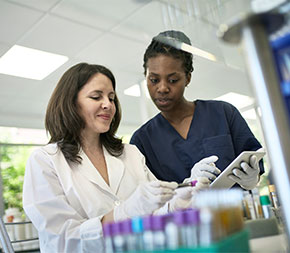
Medical Tech Overview
A medical technician is a crucial healthcare professional who supports physicians and hospitals in providing quality patient care. They perform essential tasks, such as conducting laboratory tests on blood, bodily fluids, and tissue samples. By generating accurate test results, medical technicians assist doctors in making informed decisions regarding treatment plans.
Medical technicians use sophisticated equipment and often work in several areas of a clinical lab. However, specialists are also needed and have different responsibilities and levels of interaction with patients. Some work directly with patients—phlebotomists draw blood—while others work in a lab (histotechnicians). Without compassionate phlebotomists, patients’ fears and phobias would be exacerbated. Without skilled med lab techs, tests wouldn’t be accurate and useful.
Because of their exposure to bodily fluids, medical technicians often wear protective eye shields, gloves and other gear. If you’re unfazed by blood and are interested in joining a unique field that marries science and medicine, you may be a good fit as a medical technician.
What Does a Medical Technician Do?
Medical technicians collect blood and other samples for the purpose of analyzing them for disease and other issues. If you choose a specialization, like phlebotomy, your job may include some, but not all of the duties below, as well as different tasks. The list below encompasses responsibilities across various med tech jobs.
What Education or Certification Do I Need?
Medical technicians hold an associate’s degree or postsecondary certificate from a college or vocational school. Med techs shouldn’t be confused with medical laboratory technologists who need a bachelor’s degree to work in the field.
If you plan to become a surgical tech and earn a diploma or certificate, you’ll need to complete a two-year internship unless you have seven years of prior health care experience.
Medical technician certification isn’t required in all states, but many employers will look for that seal of approval that you’ve gained the knowledge necessary to work in the field. Some employers will even include it as a stipulation for employment or advancement.
Phlebotomist Certification:
Upon passing an exam, you’ll earn the title of Certified Phlebotomy Technician (CPT) or Registered Phlebotomy Technician (RPT). Certification agencies are below:
Surgical Tech Certification:
The National Board of Surgical Technology and Surgical Assisting certifies those who pass their exam and designates them as Certified Surgical Technologists (CST).
The National Center for Competency testing (NCCT) requires candidates to graduate from an accredited program with two years on the job at a hospital or seven years of experience in the health care field. Upon passing the exam, you may use the Tech in Surgery-Certified (TS-C) credential.
Medical Laboratory Technician Certification:
A requirement for those who must become licensed in their state.
The National Credentialing Agency for Laboratory Personnel offers a nationally-recognized test. Once candidates pass the exam, they are given the title of Clinical Laboratory Technician (CLT).
The American Society for Clinical Pathology (ASCP) and American Medical Technologists certifies those who pass an exam. They are designated as Certified Medical Laboratory Technicians (MLT).
Certifications are available for other specialties in the med tech field as well. This information may be provided to you during your coursework or you can contact your state board of health.
What Career Paths Can I Take as a Medical Technician?
Before you begin your medical technician education, think about what type of environment you want to work in. For example, if you prefer working on a close-knit team where you are relied on to complete tasks in a fast-paced environment, a surgical tech position in a hospital could be for you.
Medical technicians can also enjoy an upward career trajectory. Earning a bachelor’s degree to become a medical technologist is one way to advance.
According to the U.S. Bureau of Labor Statistics (BLS), the majority (44%) of med techs work in hospitals. Other places include doctors’ offices and medical and diagnostic laboratories. For instance, a histotechnician, who cuts and stains tissues, may find a solid career in labs. Your salary will depend upon your specialization within the field, as well as education, location, and years of experience.
A career in phlebotomy has many options. Phlebotomists work at hospitals, donation facilities, labs and anywhere else blood is drawn and analyzed. Some work in home health care and travel to patients who are home-bound.
Operating and delivery rooms at hospitals are where most surgical techs are necessary, but your career path may also lead you to outpatient care facilities or working with a surgeon who performs specialized surgeries.